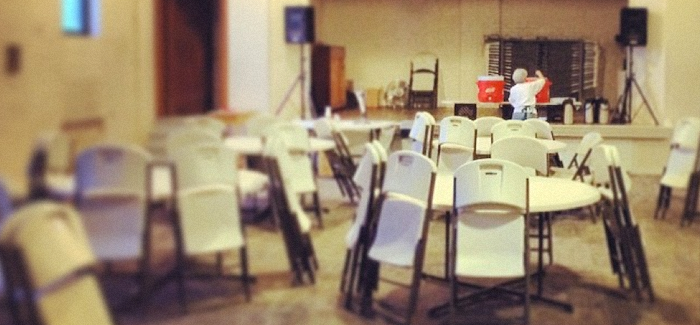
Setting up for a meal. (Photo courtesy Ravenswood Community Services)
Anne Ford, AM’99, talks to people who are hungry for more than food.
I try not to cry at work, if I can avoid it. It unnerves people.
But Anne Ford’s (AM’99) new book, A Friend That I Can Do for: Stories from Ravenswood Community Services at All Saints’ Episcopal Church, brought me low. It’s a collection of interviews she did over a five-year period (2008–12) at the free Tuesday dinners held in Ravenswood, on Chicago’s North Side.
There are interviews with the people who serve the free meals and with the people who eat them. Ford makes no distinction between the two. Her style is to present each interview as an edited first-person account—as if the person being interviewed were speaking directly to you.
The title comes from a regular diner, “Luke” (some of the interviewees did not want their names used), who insisted on pulling out chairs and fetching water for everyone at his table. When Ford asked why, he explained, “I have to have a friend that I can do for.”
In the first interview of the book, Andrea, a volunteer, talks about how awkward she felt at first, sitting down and chatting with the people eating dinner. (The greatest need for volunteers is not to cook or serve the meal, but just to chat.)
[[{"type":"media","view_mode":"media_original","fid":"1154","attributes":{"alt":"","class":"media-image","height":"290","typeof":"foaf:Image","width":"460"}}]]
Then Andrea learned her father had stomach cancer. When one of the diners noticed she was upset, she told him why.
He said, “Well, I’ll pray for you.”
I said, “Would you pray for my dad, too?”
He said, “Yeah. Better yet, let’s pray together.”
I was just like, Oh, shit.
I said, “Okay, that would be nice.”
He took my hands in his, and he started saying the Lord’s Prayer. He doesn’t remember my name. He calls me Purty. So he said, “God, please take care of Purty’s dad.” I was bawling.
See, and just typing that out, I started crying at work again.
The project, which also includes black-and-white photographs by Charlie Simokaitis, was Ford’s idea. “I can’t really tell you what sparked it, except that I love hearing people’s stories,” she says. “From the very first interview, it was immediately apparent that the subjects had so much to say.
“They were unbelievably hungry for someone to just sit down and ask them questions and listen to the answers. I had people cry; I had people tell me they loved me. And I wasn’t doing anything special, you understand, just sitting down with them for an hour or so and asking them whatever questions it occurred to me to ask about their lives.”
[[{"type":"media","view_mode":"media_original","fid":"1155","attributes":{"alt":"","class":"media-image","height":"290","typeof":"foaf:Image","width":"460"}}]]
If you ever wondered how someone might end up sleeping under the Damen Avenue bridge for ten years, “Luke” can tell you. And if you ever thought of asking someone who sleeps under the Damen Avenue bridge to take care of your elderly relative, here’s what might happen.
I was house-sitting for a guy who had to go to prison for two months. He came and dug me up from under the bridge to sit with this 80-year-old lady till he gets back. The lady, if she put anything on the stove to cook, she’d walk off and forget about it. I told her, “Don’t cook nothing. I will cook for you.”
I had money, so I went to Aldi’s. I cooked a duck. I had it on the table. I had candles lit. I ran to the liquor store and bought some Boone Farm Strawberry Hill. She tastes it—I made her a plate and everything—and she tells me in her 80 years of life, ain’t no man in her life ever did what I just did. I said, “Oh, my Lord.” What’s wrong with these people that this lady’s dealing with?
All profits from sales of the book will benefit Ravenswood Community Services, which organizes the food pantry and the dinners.
“This book is for the hungry,” reads the dedication. “May we all be well fed.”
